Books
Soul Loss: Life Lessons from the Tragic Tale of Undine
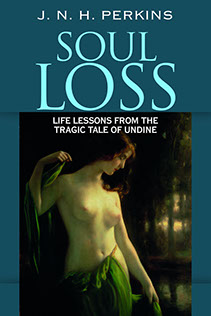 This clearly written book introduces the reader to a succinct psychological understanding of the age-old tale of Undine. Here, a beautiful female water sprite with a human body marries a noble knight, Huldbrand, in order to gain a mortal soul. But during the course of the story, Huldbrand proves himself unworthy of Undine’s lovely feminine integrity. Under the increasing influence of a proud and haughty lady, Bertalda, Huldbrand grows distrustful of Undine’s earnest devotion to him. Competing for his attention, Bertalda cleverly fans the coals of distrust and fear in Huldbrand’s soul, convincing him that Undine is nothing more than a malevolent mermaid set upon ruining Bertalda’s reputation in Huldbrand’s eyes. The knight’s failure to recognize Undine’s innocent loyalty leads to his downfall. As he angrily spurns Undine’s genuine love, she retreats to the marine world, only to return later to claim him through death. Each episode of the story is followed by insightful psychological commentary that brings the reader to a lucid appreciation of the interior landscape of the human personality revealed by this tragic tale.
This clearly written book introduces the reader to a succinct psychological understanding of the age-old tale of Undine. Here, a beautiful female water sprite with a human body marries a noble knight, Huldbrand, in order to gain a mortal soul. But during the course of the story, Huldbrand proves himself unworthy of Undine’s lovely feminine integrity. Under the increasing influence of a proud and haughty lady, Bertalda, Huldbrand grows distrustful of Undine’s earnest devotion to him. Competing for his attention, Bertalda cleverly fans the coals of distrust and fear in Huldbrand’s soul, convincing him that Undine is nothing more than a malevolent mermaid set upon ruining Bertalda’s reputation in Huldbrand’s eyes. The knight’s failure to recognize Undine’s innocent loyalty leads to his downfall. As he angrily spurns Undine’s genuine love, she retreats to the marine world, only to return later to claim him through death. Each episode of the story is followed by insightful psychological commentary that brings the reader to a lucid appreciation of the interior landscape of the human personality revealed by this tragic tale.
Rapture Alive
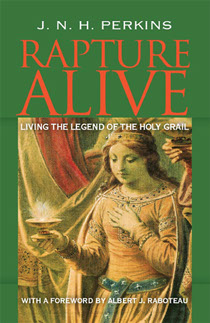 Three stages of psychological development are explained and clearly demonstrated in this retelling of the medieval tale of Perceval and his search for the Holy Grail. First comes an innocent child’s spontaneous and imaginative enthusiasm. Second is the period when a young man or woman strives to become an educated and normal grown-up in order to achieve competent peer status in the surrounding culture. But this feat of success comes with strings attached. It requires the restraint of creative imagination and audacious curiosity. Such conformity to ideal standards gradually leads to a collective institutionalization of the human personality and thereby to the disenchantment of the world. Finally comes a third, fully mature stage, rarely achieved, though universally craved. This is a kind of grounded mystical experience—a recovering of the youthful awe and rapture experienced in stage one—yet within a stable adult awareness. Now a more aware and enlightened innocence may be realized in consciousness; the excitement and the mystery of living are restored and the world once again becomes a land of enchantment—a Heaven on Earth. It has been said that only a few poets and saints ever realize this stage. Yet, as there are indeed such poets and saints dwelling within each of us, we have reason to be hopeful. In our adult lives, this involves the retrieval of a burgeoning imagination so reminiscent of childhood.
Three stages of psychological development are explained and clearly demonstrated in this retelling of the medieval tale of Perceval and his search for the Holy Grail. First comes an innocent child’s spontaneous and imaginative enthusiasm. Second is the period when a young man or woman strives to become an educated and normal grown-up in order to achieve competent peer status in the surrounding culture. But this feat of success comes with strings attached. It requires the restraint of creative imagination and audacious curiosity. Such conformity to ideal standards gradually leads to a collective institutionalization of the human personality and thereby to the disenchantment of the world. Finally comes a third, fully mature stage, rarely achieved, though universally craved. This is a kind of grounded mystical experience—a recovering of the youthful awe and rapture experienced in stage one—yet within a stable adult awareness. Now a more aware and enlightened innocence may be realized in consciousness; the excitement and the mystery of living are restored and the world once again becomes a land of enchantment—a Heaven on Earth. It has been said that only a few poets and saints ever realize this stage. Yet, as there are indeed such poets and saints dwelling within each of us, we have reason to be hopeful. In our adult lives, this involves the retrieval of a burgeoning imagination so reminiscent of childhood.
As Professor Albert J. Raboteau of Princeton University writes, “John Perkins wisely and eloquently draws upon the symbols, themes, and myths embedded in a twelfth-century tale, The Story of the Grail, to describe the circular pathway moving through the three stages of enchantment, disenchantment, and re-enchantment. Perkins carefully places the tale of Perceval, as crafted by the masterful Chrétien de Troyes, in the context of medieval Christendom, including its chivalric ethic, system of belief and ritual, and theological controversy—all the while illuminating the underlying symbolic motifs and psychological truths of the narrative that remain of perennial value for us today.”
The Sacred Sinner
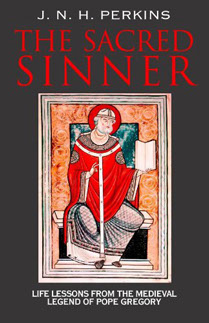 A retelling and psychological exploration of the extraordinary medieval legend of Pope Gregory, a child conceived in sibling incest, who was later abandoned to the sea and raised abroad to be a monk. After learning his outcast origin, he abandoned the cloister to become a knight errant, traveled afar, won a heroic battle and unsuspectingly married his own mother. Discovering this horror, in remorse and fear for his soul he began a life-long penance on a lonely rock in the sea. Nearly dead after seventeen years, he was chosen to become the wisest and most compassionate pope of all time.
A retelling and psychological exploration of the extraordinary medieval legend of Pope Gregory, a child conceived in sibling incest, who was later abandoned to the sea and raised abroad to be a monk. After learning his outcast origin, he abandoned the cloister to become a knight errant, traveled afar, won a heroic battle and unsuspectingly married his own mother. Discovering this horror, in remorse and fear for his soul he began a life-long penance on a lonely rock in the sea. Nearly dead after seventeen years, he was chosen to become the wisest and most compassionate pope of all time.
This book retells the whole story and offers psychological life lessons that are relevant to people of today about our relations with parents, with children, with our religious sensibilities, and most importantly, with our own deepest yearnings for a fulfilling life.
The original story, which is religious in tone, implies a tendency toward asceticism, but, on the whole, its intent seems rather to be the reconciliation of the extreme opposites of life; to establish a middle way of human conduct between the worldly pursuits of knighthood and the ascetic ideals of medieval religion.
Death and the Maiden
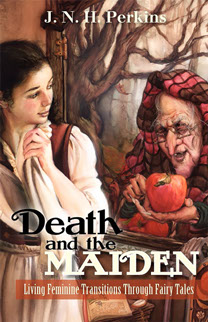 This fascinating and elegantly written book re-tells and masterfully interprets seven intriguing fairytales from six different cultures of the world. John N. H. Perkins brings home to us in the most startling ways the vital inner truths of the human personality that are revealed in these ancient stories. He challenges us to embrace the rich, profound, and intelligent feminine dimension of the human psyche, one that neither requires women to become imitation men, nor men to retreat to effeminacy. These tales prove to be the stories of our own lives, bringing us wisdom, insight, and spiritual nourishment as well as an understanding of how transforming and invigorating the prototypical feminine can be. Once Lady Life is liberated from being a sex-object for men, awakens from her enthrallment to become an equal partner with the masculine, together they may revolutionize the way both men and women live, work, and relate to each other.
This fascinating and elegantly written book re-tells and masterfully interprets seven intriguing fairytales from six different cultures of the world. John N. H. Perkins brings home to us in the most startling ways the vital inner truths of the human personality that are revealed in these ancient stories. He challenges us to embrace the rich, profound, and intelligent feminine dimension of the human psyche, one that neither requires women to become imitation men, nor men to retreat to effeminacy. These tales prove to be the stories of our own lives, bringing us wisdom, insight, and spiritual nourishment as well as an understanding of how transforming and invigorating the prototypical feminine can be. Once Lady Life is liberated from being a sex-object for men, awakens from her enthrallment to become an equal partner with the masculine, together they may revolutionize the way both men and women live, work, and relate to each other.
The Love Grotto: Life Lessons About Sex, Love,
Religion, and Society in Gottfried Von Strassburg's
Tale of Tristan
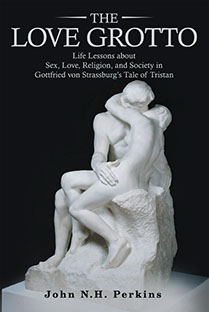 This book introduces the reader to a feminist psychological understanding of the age-old tale of the tragic lovers Tristan and Isolde. John Perkins offers us a series of life lessons designed to heighten our appreciation of our own sensibilities as he retells and examines Gottfried von Strassburg's twelfth century work Tristan.
This book introduces the reader to a feminist psychological understanding of the age-old tale of the tragic lovers Tristan and Isolde. John Perkins offers us a series of life lessons designed to heighten our appreciation of our own sensibilities as he retells and examines Gottfried von Strassburg's twelfth century work Tristan.
The central dilemma is the tension between our duty to follow the ingrained patriarchal values of our society on the one hand and an in-depth realization of our holistic human nature on the other-following an authentic life over a prescribed one; the struggle between obligation and love-behaving correctly under surveillance (the watchful dictates of law or custom) or living by the spontaneous inclinations of the illumined heart.
Buy Book
Buy Book
Buy Book
Buy Book
Buy Book
Copyright © 2021
All rights reserved. johnperkins.me
Website by Gabrielle Dragan.